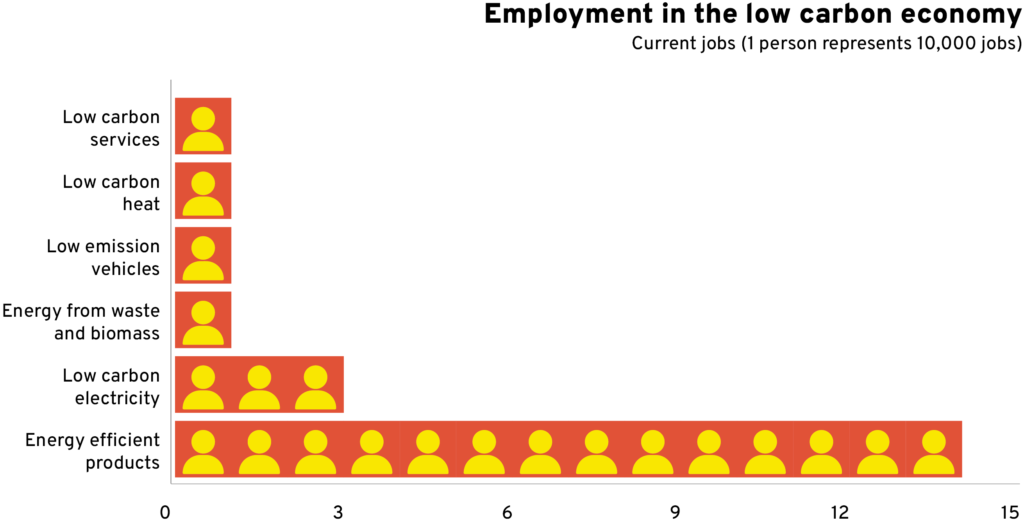
Low carbon services (10,000 jobs), Low carbon heat (10,000 jobs), Low emission vehicles (10,000 jobs), energy from waste and biomass (10,000 jobs), Low carbon electricity (30,000 jobs), Energy efficient products (140,000 jobs)
Hundreds of thousands of jobs will be created across English regions by 2050 to support the transition to a low carbon economy.
North West
170,000 jobs in total could be created, with new jobs to increase England’s wind capacity and nuclear operations. In 2021, Greater Manchester LEP launched Bee Net Zero, an ambitious commitment to make the city-region the easiest place in the UK to be a green business.
North East
84,000 jobs are expected to be created to construct, install and maintain Carbon Capture & Storage (CCS) plants to decarbonise energy production and carbon intensive industries (such as cement manufacturing and large oil refineries). The North of Tyne Combined Authority’s Green New Deal Fund will invest £18 million in low carbon infrastructure and directly into SMEs to support business growth and innovation. The fund will catalyse investment in green growth, stimulate innovation and enable sector and supply chain growth.
Yorkshire and Humber
167,000 jobs with employment opportunities could be created from the installation of bioenergy facilities and the production of hydrogen to support industrial (and wider) decarbonisation.
Midlands
An estimated 194,000 jobs working in low-carbon sectors, including in manufacturing low emission vehicles and battery packs in gigafactories, plus jobs in low carbon heating technologies, energy efficiency products and solar installations. The West Midlands Gigafactory, a joint public-private venture between Coventry City Council and Coventry Airport Ltd, will begin supplying high tech batteries for electric vehicles from 2025. The £2.5bn investment will create up to 6,000 new highly skilled jobs directly and thousands more in the wider supply chain.
London and South East
447,000 jobs could be supported to deliver the transition to net zero. Many of these jobs will be in the financial, IT or legal sector supporting low-carbon activity. This is due to the strong service sector in the London and south England regions.
South West
140,000 jobs in total including in delivering low-carbon electricity generation in solar deployment, nuclear operations and maintenance. Dorset’s environmental economy is estimated to be worth between £0.9bn and £2.5bn per annum, about 8-10% of the overall economy.
East
119,000 jobs in total including in low-emission vehicle and component manufacturing, and low-carbon financial and IT services.
Scotland
Up to 367,000 jobs in total; many in the green energy sector. The renewable energy industry now provides 97% of Scotland’s energy; this supports almost 3000 jobs in construction and 2200 jobs in manufacturing.
Northern Ireland
The Energy Strategy for Northern Ireland has a target of doubling the size of the NI low carbon and renewable energy economy to a turnover of more than £2bn by 2030.
Wales
60,000 jobs in total; according to the PWC green jobs barometer, Wales currently has a low proportion of new jobs which are green; the focus should be on identifying and developing green industries to complement its existing clusters and skills.
Next Section:
4.3 Business case

